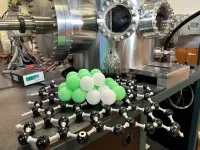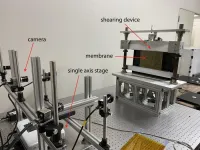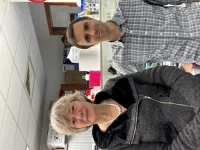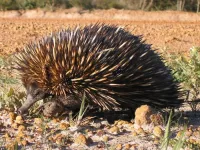(Press-News.org) ORACLE test predicts overall cancer survival independent of currently used clinical risk factors, and it has the best predictive power in stage 1 lung cancer.
A high ORACLE score is associated with a higher risk of cancer spread.
ORACLE could potentially be used to pick out patients who would benefit most from chemotherapy.
Researchers at the Francis Crick Institute, the UCL Cancer Institute and UCLH have shown that a test called ORACLE can predict lung cancer survival at the point of diagnosis better than currently used clinical risk factors. This could help doctors make more informed treatment decisions for people with stage 1 lung cancer, potentially reducing the risk of the cancer returning or spreading.
In research published today in Nature Cancer, the team tested ORACLE in 158 people with lung cancer as part of the Cancer Research UK-funded TRACERx study. They found that ORACLE could better predict patient survival than currently used clinical standards like tumour stage.
ORACLE was developed in 2019 to overcome the lack of biological markers in lung cancer, which can indicate to doctors who might be at a greater risk of their cancer coming back or spreading to another part of the body1.
This is particularly important for people with stage 1 lung cancer, who are normally given surgery without chemotherapy. For a quarter of stage 1 patients, their cancer returns, suggesting they may have benefitted from more frequent monitoring or chemotherapy.
When doctors take a sample from a tumour, they typically only capture less than 1% of the tumour, and the genetics can vary massively from region to region within the same tumour. ORACLE overcomes this by looking at genes expressed at a high or low level in every part in the tumour.
The new findings show that ORACLE could predict which patients with stage 1 lung cancer had a lower chance of survival, and might benefit from chemotherapy as well as surgery. Currently used clinical standards weren’t able to give this information for stage 1 patients.
The researchers also found that high ORACLE risk scores were linked to regions of the tumour that were more likely to spread to another part of the body.
Finally, by looking at 359 current and potential lung cancer drugs, they found that a high ORACLE risk score predicted better response to some types of chemotherapy, particularly platinum drugs like cisplatin
This is because tumour regions with high ORACLE scores are associated with unstable DNA (called ‘chromosomal instability’), which is particularly targeted by platinum drugs. The same lab has recently found that changes in a key gene called FAT1 drive chromosomal instability, which is also one of the genetic variations ORACLE looks for.
The next steps for the researchers are to compare people with high ORACLE scores receiving standard care and those receiving more surveillance or chemotherapy to determine if the test improves survival, even for people diagnosed at the earliest stage.
Dhruva Biswas, Translation Fellow at the Crick, Postdoctoral Fellow at the UCL Cancer Institute, Associate Research Scientist at Yale School of Medicine, and co-first author, said: “ORACLE can now predict survival rates in patients diagnosed at the earliest stage. If validated in larger cohorts of patients with lung cancer, doctors could one day use ORACLE to help make informed treatment decisions, bringing lessons from cancer evolution into the clinic.”
Yun-Hsin Liu, Research Assistant at the UCL Cancer Institute, and co-first author, said: “We wanted to build on the previous work developing ORACLE and show that it can predict survival at the point of a lung cancer diagnosis. We’ve also shown that it can predict who would benefit from certain types of chemotherapy drugs or if someone’s cancer is likely to spread, giving a holistic measure of how a patient’s cancer might progress and respond.”
Charles Swanton, Deputy Clinical Director and Head of the Cancer Evolution and Genome Instability Laboratory at the Crick, medical oncologist at University College London Hospitals, Chair in Personalised Cancer Medicine at the UCL Cancer Institute, Chief Investigator for TRACERx, and co-senior author of the study, said: “Lung cancer is the leading cause of cancer-related death throughout the world, so it’s clear we need better markers to accurately classify tumours and predict who is at high risk. We’re now working with the Translation team at the Crick and industry partners to progress ORACLE into a test which could hopefully be used in the clinic as soon as possible.”
Paul Mercer, Head of Industry Partnerships in the Crick Translation team, said: “This is an important step forward, translating our understanding of the infinite complexities of lung cancer mutation into a diagnostic tool, prioritising patients for the most effective therapies. We look forward to working with partners to take this work forward and maximise patient benefit from ORACLE.”
Dani Edmunds, Science Engagement Manager at Cancer Research UK, said: "In the last 50 years, cancer survival has doubled in the UK. However, progress has not been equal across all types of cancer. Although survival for lung cancer has improved since the 1970s, it’s still one of the most challenging cancers to treat.
"New tests to predict lung cancer’s behaviour could help doctors tailor treatment strategies to each person’s condition, giving the best chance of a successful outcome.
"This research reflects Cancer Research UK’s commitment to tackle this hard-to-treat cancer. While ORACLE still needs testing in larger-scale trials, these initial results show it could take us a step closer to more personalised approaches to treating lung cancer, so more people live longer, better lives."
The study is supported by the National Institute for Health and Care Research UCLH Biomedical Research Centre.
Peer reviewed
Observational study
People
For further information, contact: press@crick.ac.uk or +44 (0)20 3796 5252
Notes to Editors
Reference: Biswas, D and Liu, YH. et al. (2025). Prospective validation of ORACLE, a clonal expression biomarker associated with survival of patients with lung adenocarcinoma. Nature Cancer. 10.1038/s43018-024-00883-1.
In research published in Nature Medicine in 2019, the team analysed genetic information from 156 tumour regions from 46 patients enrolled in TRACERx. They identified genes expressed in cells throughout the whole tumour which increase cancer cell reproduction. They used this information to generate a package of genes to look for in a sample (ORACLE). This research reports the testing of ORACLE in another set of TRACERx samples, to validate its ability to predict patient survival, particularly within the stage 1 group.
The Francis Crick Institute is a biomedical discovery institute dedicated to understanding the fundamental biology underlying health and disease. Its work is helping to understand why disease develops and to translate discoveries into new ways to prevent, diagnose and treat illnesses such as cancer, heart disease, stroke, infections, and neurodegenerative diseases.
An independent organisation, its founding partners are the Medical Research Council (MRC), Cancer Research UK, Wellcome, UCL (University College London), Imperial College London and King’s College London.
The Crick was formed in 2015, and in 2016 it moved into a brand new state-of-the-art building in central London which brings together 1500 scientists and support staff working collaboratively across disciplines, making it the biggest biomedical research facility under a single roof in Europe.
http://crick.ac.uk/
END
Lung cancer test predicts survival in early stages better than current methods
2025-01-09
ELSE PRESS RELEASES FROM THIS DATE:
Pioneering new mathematical model could help protect privacy and ensure safer use of AI
2025-01-09
UNDER EMBARGO UNTIL 10 AM GMT / 5 AM ET THURSDAY 9 JANUARY 2025
Pioneering new mathematical model could help protect privacy and ensure safer use of AI
AI tools are increasingly being used to track and monitor us both online and in-person, yet their effectiveness comes with big risks. Computer scientists at the Oxford Internet Institute, Imperial College London, and UCLouvain have developed a new mathematical model which could help people better understand the risks posed by AI and assist regulators in protecting peoples’ privacy. The findings have been published today (9 January) in Nature Communications.
For ...
Floods, droughts, then fires: Hydroclimate whiplash is speeding up globally
2025-01-09
Key takeaways
Hydroclimate whiplash – rapid swings between intensely wet and dangerously dry weather – has already increased globally due to climate change, with further large increases expected as warming continues, according to a team of researchers led by UCLA’s Daniel Swain.
The “expanding atmospheric sponge,” or the atmosphere’s ability to evaporate, absorb and release 7% more water for every degree Celsius the planet warms, is a key driver of the whiplash.
Co-management of extreme rainfall or extreme droughts, ...
Scientists fuel sustainable future with catalyst for hydrogen from ammonia
2025-01-09
Scientists have created a catalyst for hydrogen generation from ammonia that becomes more active with time, and by counting atoms revealed changes that boost the catalyst’s performance.
A research team from the University of Nottingham's School of Chemistry, in collaboration with the University of Birmingham and Cardiff University, has developed a novel material consisting of nanosized ruthenium (Ru) clusters anchored on graphitized carbon. These Ru nanoclusters react with ammonia molecules, catalysing splitting ammonia into ...
Discovering hidden wrinkles in spacecraft membrane with a single camera
2025-01-09
Exiting Earth’s gravity takes an enormous amount of fuel and power. Due to this, spacecraft strapped to rockets are limited in their carry capacity and every gram must be accounted for. To lighten the load, thin membranes are being researched as alternative materials, but their plastic wrap property causes wrinkling that can affect operational performance. For this reason, there is a need to develop measurement technology that can accurately detect deformations.
Professor Takashi Iwasa at Osaka Metropolitan University’s Graduate School of Engineering led a team in developing a method for measuring the size of wrinkles ...
Women are less likely to get a lung transplant than men and they spend six weeks longer on the waiting list
2025-01-09
Women are less likely to receive a lung transplant and spend an average of six weeks longer on the waiting list, according to a study published today (Thursday) in ERJ Open Research [1]. However, women who receive a lung transplant are more likely than men to live for five years post-transplant. Based on their findings, the researchers encourage changes in regulation and clinical guidelines to address this inequality.
Lung transplantation is the only treatment for people with end-stage respiratory failure and patients on the waiting list have a high risk ...
Study sheds more light on life expectancy after a dementia diagnosis
2025-01-09
The average life expectancy of people diagnosed with dementia ranges from 9 years at age 60 to 4.5 years at age 85 for women and from 6.5 to just over 2 years, respectively, in men, finds a systematic review of the latest evidence in The BMJ today.
The results also suggest that one third of people with dementia are admitted to a nursing home within three years of diagnosis.
Nearly 10 million people worldwide receive a diagnosis of dementia every year, but survival estimates vary widely, and few ...
Tesco urged to drop an “unethical” in-store infant feeding advice service pilot
2025-01-09
UK supermarket giant Tesco is being urged to drop an “unethical” pilot of an in-store infant feeding advice service in which Danone-funded midwives are expected to wear branded uniforms and undergo training by the formula company, reveals an exclusive news report published by The BMJ today.
Critics say that the initiative, running in Tesco’s flagship store and set to be rolled out shortly, is a backward step and reminiscent of the “milk nurses” scandal of the 1970s, where formula industry salespeople dressed as nurses and promoted formula milk to parents.
One midwife hired by Danone quit ...
Unraveling the events leading to multiple sex chromosomes using an echidna genome sequence
2025-01-09
Unraveling the Events Leading to Multiple Sex Chromosomes Using an Echidna Genome Sequence
A nearly gapless genome sequence of the echidna, an egg-laying mammal with multiple sex chromosomes, helps researchers to track genomic reorganization events that gave rise to a highly unusual sex determination system.
The short-beaked echidna (Tachyglossus aculeatus) is one of Australia’s most iconic animals. Belonging to a unique group of mammals called “monotremes” (with the platypus as the other prominent member). Echidnas may at first glance be mistaken for a weird-looking hedgehog, ...
New AI platform identifies which patients are likely to benefit most from a clinical trial
2025-01-08
A new study led by Winship Cancer Institute of Emory University and Abramson Cancer Center of University of Pennsylvania researchers demonstrates that a first-of-its-kind platform using artificial intelligence (AI) could help clinicians and patients assess whether and how much an individual patient may benefit from a particular therapy being tested in a clinical trial. This AI platform can help with making informed treatment decisions, understanding the expected benefits of novel therapies and planning ...
Unique Stanford Medicine-designed AI predicts cancer prognoses, responses to treatment
2025-01-08
The melding of visual information (microscopic and X-ray images, CT and MRI scans, for example) with text (exam notes, communications between physicians of varying specialties) is a key component of cancer care. But while artificial intelligence helps doctors review images and home in on disease-associated anomalies like abnormally shaped cells, it’s been difficult to develop computerized models that can incorporate multiple types of data.
Now researchers at Stanford Medicine have developed an AI model able to incorporate visual ...



